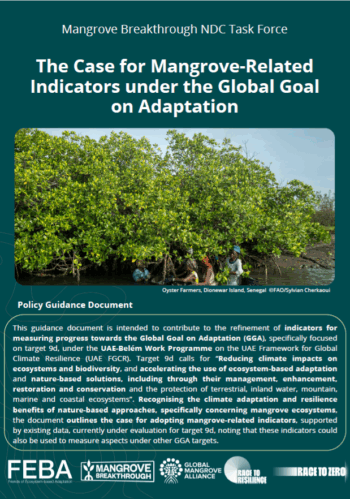Knowledge Products
FEBA members collaborate through both formal working groups as well as ad-hoc groups to produce collective knowledge products on a range of thematic issues, working to advance awareness, understanding and uptake of nature-based solutions for adpatation and resilience in on-ground efforts, local and national adaptation planning, and multilateral policy frameworks. See the full repository of FEBA knowledge products below.
FEBA, in collaboration with the Mangrove Breakthrough NDC Task Force, has developed a policy guidance brief to inform the indicator selection process for measuring progress towards the Global Goal on Adaptation (GGA) — centred on GGA Target 9d: reducing climate impacts on ecosystems and biodiversity.
Recognising the climate adaptation and resilience benefits of nature-based approaches — specifically concerning mangroves — the brief outlines the case for adopting mangrove-related indicators, supported by existing data available through the Global Mangrove Watch. GGA Indicators Mangrove Breakthrough NDC Task Force Policy Guidance
FEBA, in collaboration with the Mangrove Breakthrough NDC Task Force, has developed a policy guidance brief to inform the indicator selection process for measuring progress towards the Global Goal on Adaptation (GGA) — centred on GGA Target 9d: reducing climate impacts on ecosystems and biodiversity.
Recognising the climate adaptation and resilience benefits of nature-based approaches — specifically concerning mangroves — the brief outlines the case for adopting mangrove-related indicators, supported by existing data available through the Global Mangrove Watch. GGA Indicators Mangrove Breakthrough NDC Task Force Policy Guidance
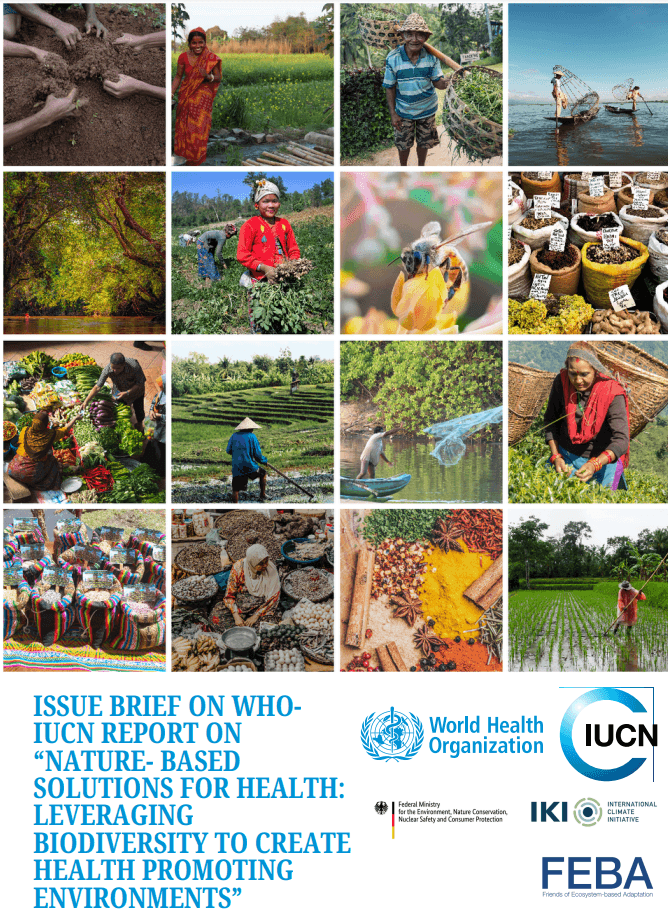
This report offers a set of key recommendations and real-world examples as practical models for scaling up NbS to benefit people and nature. NbS, combined with holistic frameworks such as One Health, provide a critical foundation for safeguarding human, animal, plant, and ecosystem health. Policymakers must collaborate with diverse stakeholders to increase investments in NbS, foster knowledge-sharing, and prioritize the protection and empowerment of vulnerable communities. This report serves as a springboard for that action, paving the way for a future in which healthy ecosystems and healthy people thrive together.
This report offers a set of key recommendations and real-world examples as practical models for scaling up NbS to benefit people and nature. NbS, combined with holistic frameworks such as One Health, provide a critical foundation for safeguarding human, animal, plant, and ecosystem health. Policymakers must collaborate with diverse stakeholders to increase investments in NbS, foster knowledge-sharing, and prioritize the protection and empowerment of vulnerable communities. This report serves as a springboard for that action, paving the way for a future in which healthy ecosystems and healthy people thrive together.
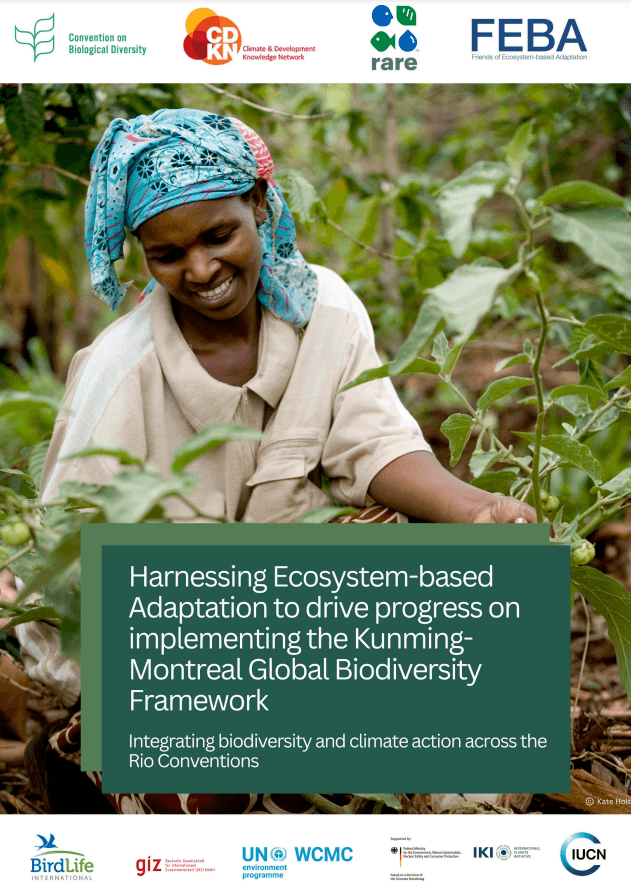
This publication offers consolidated evidence, guidance and case studies on EbA to support the uptake of EbA across national strategies and plans for all three Rio Conventions and inform the development of revised national biodiversity and climate commitments. While the primary focus of the publication is on the CBD and UNFCCC, it also highlights links to other global frameworks, including the UNCCD and the Sendai Framework for Disaster Risk Reduction. This is presented with tools and resources to support governments in the planning, implementation, monitoring and reporting of EbA in their national commitments and strategies, including, crucially, as a contribution to the implementation of KMGBF Targets 8 and 11 as related to adaptation, resilience and disaster risk reduction.
This publication offers consolidated evidence, guidance and case studies on EbA to support the uptake of EbA across national strategies and plans for all three Rio Conventions and inform the development of revised national biodiversity and climate commitments. While the primary focus of the publication is on the CBD and UNFCCC, it also highlights links to other global frameworks, including the UNCCD and the Sendai Framework for Disaster Risk Reduction. This is presented with tools and resources to support governments in the planning, implementation, monitoring and reporting of EbA in their national commitments and strategies, including, crucially, as a contribution to the implementation of KMGBF Targets 8 and 11 as related to adaptation, resilience and disaster risk reduction.
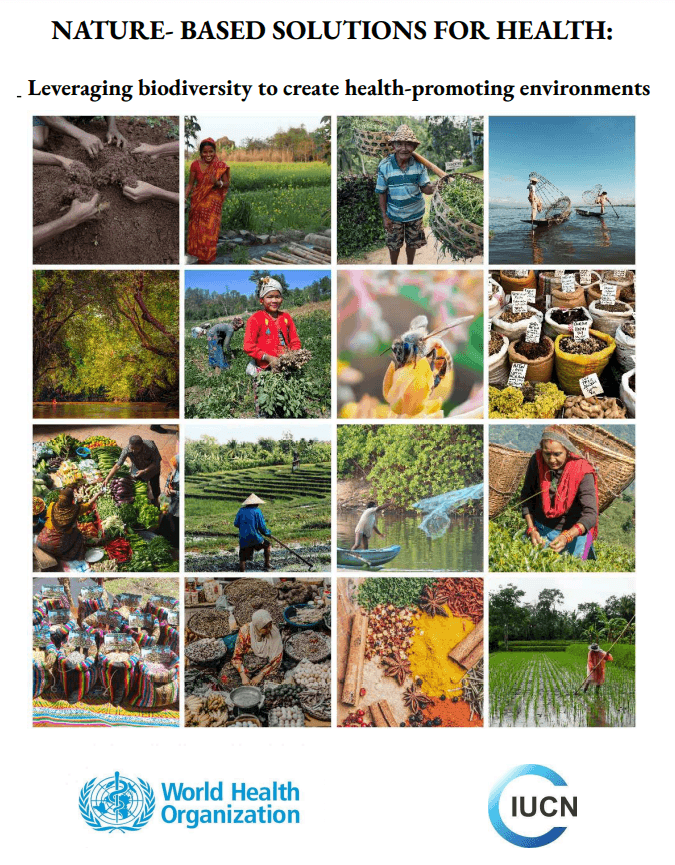
To support the growing global effort to integrate health into NbS policies and practices, the IUCN-WHO Report on Nature-based Solutions for Health provides evidence-based guidance and practical recommendations for policymakers, practitioners, and stakeholders. The report emphasises how NbS can enhance health outcomes, contribute to biodiversity conservation, while enhancing opportunities for climate adaptation and mitigation. It focuses on how nature-based approaches —such as ecosystem restoration, green infrastructure, and sustainable land use — can serve as preventive and adaptive strategies to reduce health risks, improve mental and physical well-being, and support resilient communities.
The report presents 10 practical recommendations for leveraging NbS to improve health outcomes, aligned with global frameworks like the Kunming-Montreal Global Biodiversity Framework and Sustainable Development Goals (SDGs). It features practical examples on how to effectively implement these recommendations at multiple levels — showcasing case studies and best practices across sectors, from public health to conservation and urban planning.
To support the growing global effort to integrate health into NbS policies and practices, the IUCN-WHO Report on Nature-based Solutions for Health provides evidence-based guidance and practical recommendations for policymakers, practitioners, and stakeholders. The report emphasises how NbS can enhance health outcomes, contribute to biodiversity conservation, while enhancing opportunities for climate adaptation and mitigation. It focuses on how nature-based approaches —such as ecosystem restoration, green infrastructure, and sustainable land use — can serve as preventive and adaptive strategies to reduce health risks, improve mental and physical well-being, and support resilient communities.
The report presents 10 practical recommendations for leveraging NbS to improve health outcomes, aligned with global frameworks like the Kunming-Montreal Global Biodiversity Framework and Sustainable Development Goals (SDGs). It features practical examples on how to effectively implement these recommendations at multiple levels — showcasing case studies and best practices across sectors, from public health to conservation and urban planning.
The 10th EbA Knowledge Day illuminated EbA action and illustrated its inherent benefits in supporting the synergistic attainment of goals under the Rio Conventions. Several sessions centred on cross-cutting topics of the Conventions were held during the EbA Knowledge Day. The purpose of these sessions was to examine current collaborative actions, identify gaps that exist, and hold an open forum to identify improvement areas. The event convened representatives from across the Rio Conventions, national policymakers, and practitioners to foster collective discourse and spur the advancement of the EbA agenda to achieve integrated climate and nature goals.
The 10th EbA Knowledge Day illuminated EbA action and illustrated its inherent benefits in supporting the synergistic attainment of goals under the Rio Conventions. Several sessions centred on cross-cutting topics of the Conventions were held during the EbA Knowledge Day. The purpose of these sessions was to examine current collaborative actions, identify gaps that exist, and hold an open forum to identify improvement areas. The event convened representatives from across the Rio Conventions, national policymakers, and practitioners to foster collective discourse and spur the advancement of the EbA agenda to achieve integrated climate and nature goals.
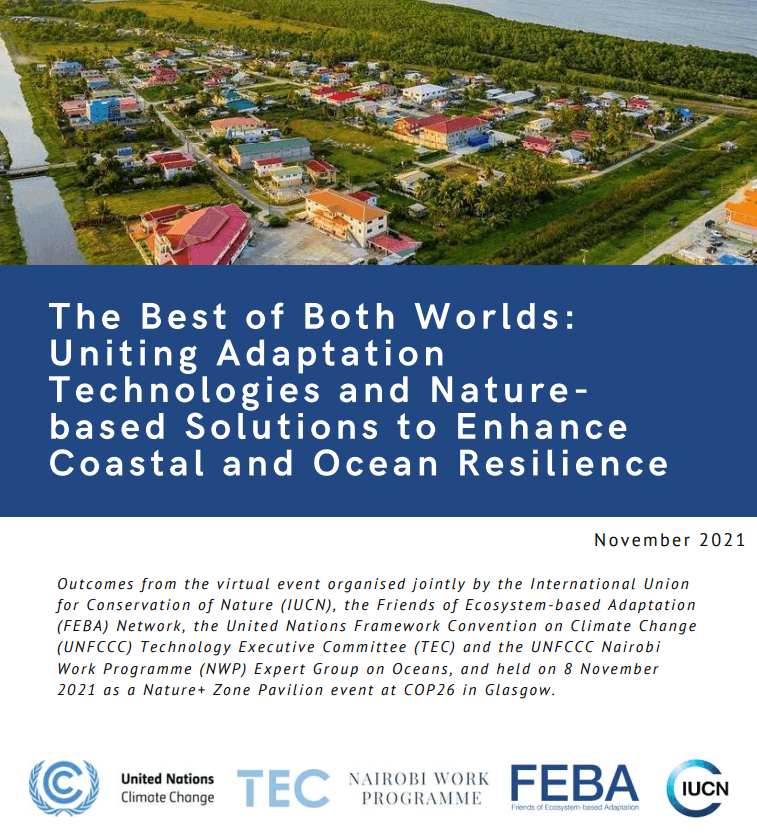
Outcomes from the virtual event organised jointly by the International Union for Conservation of Nature (IUCN), the Friends of Ecosystem-based Adaptation (FEBA) Network, the United Nations Framework Convention on Climate Change (UNFCCC) Technology Executive Committee (TEC) and the UNFCCC Nairobi Work Programme (NWP) Expert Group on Oceans, and held on 8 November 2021 as a Nature+ Zone Pavilion event at COP26 in Glasgow.
Outcomes from the virtual event organised jointly by the International Union for Conservation of Nature (IUCN), the Friends of Ecosystem-based Adaptation (FEBA) Network, the United Nations Framework Convention on Climate Change (UNFCCC) Technology Executive Committee (TEC) and the UNFCCC Nairobi Work Programme (NWP) Expert Group on Oceans, and held on 8 November 2021 as a Nature+ Zone Pavilion event at COP26 in Glasgow.
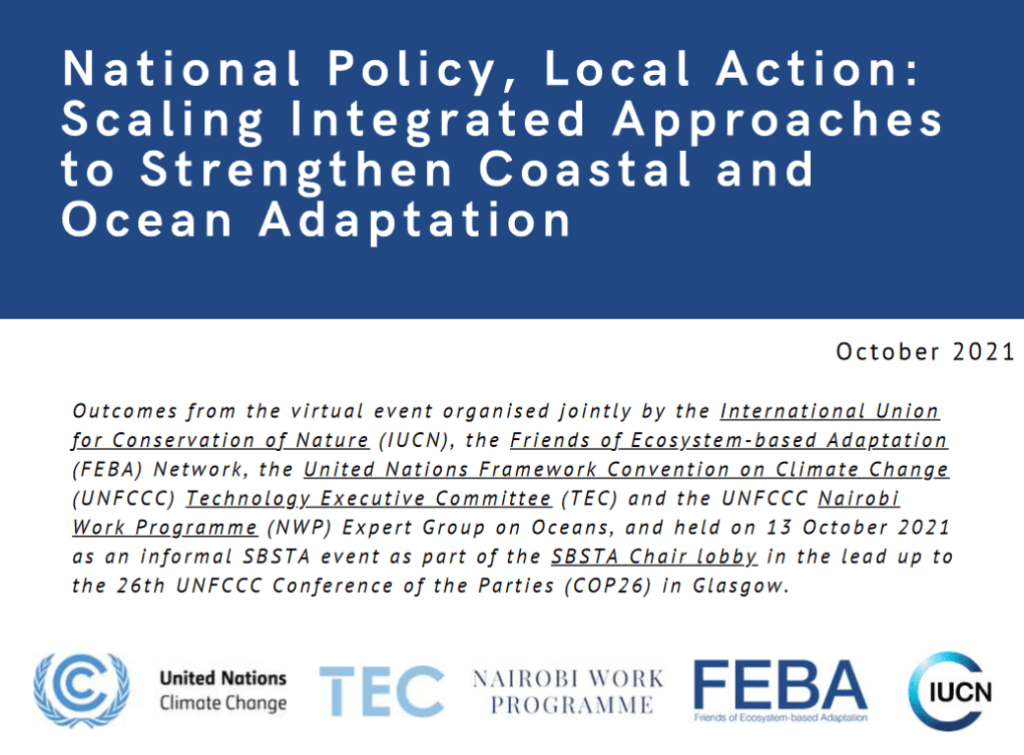
Outcomes from the virtual event organised jointly by the International Union for Conservation of Nature (IUCN), the Friends of Ecosystem-based Adaptation (FEBA) Network, the United Nations Framework Convention on Climate Change (UNFCCC) Technology Executive Committee (TEC) and the UNFCCC Nairobi Work Programme (NWP) Expert Group on Oceans, and held on 13 October 2021 as an informal SBSTA event as part of the SBSTA Chair lobby in the lead up to the 26th UNFCCC Conference of the Parties (COP26) in Glasgow.
Outcomes from the virtual event organised jointly by the International Union for Conservation of Nature (IUCN), the Friends of Ecosystem-based Adaptation (FEBA) Network, the United Nations Framework Convention on Climate Change (UNFCCC) Technology Executive Committee (TEC) and the UNFCCC Nairobi Work Programme (NWP) Expert Group on Oceans, and held on 13 October 2021 as an informal SBSTA event as part of the SBSTA Chair lobby in the lead up to the 26th UNFCCC Conference of the Parties (COP26) in Glasgow.

A fundamental objective of the FEBA network is to amplify the collective voice of the EbA community to inform climate negotiations. In preparation for UNFCCC COP28, FEBA leveraged discussions held during the 9th EbA Knowledge Day, to create four Knowledge Briefs delving into the role of EbA within distinct global climate policy mechanisms: Loss & Damage, Global Goal on Adaptation, Global Stocktake, and National Implementation.
These Knowledge Briefs serve as comprehensive documentations of insights shared during EbA & climate policy discussion tracks at the 9th EbA Knowledge Day. They serve as knowledge products for practitioners and policymakers engaged in EbA and climate action at the global, national, and local levels.
The Briefs summarise discussions and insights that emerged during the respective sessions – highlighting the views and ideas shared by participants representing various stakeholder groups (national governments, civil society, academia, etc.) – and offers several suggestions and recommendations for activities that would contribute to the advancement EbA in climate policy and practice.
A fundamental objective of the FEBA network is to amplify the collective voice of the EbA community to inform climate negotiations. In preparation for UNFCCC COP28, FEBA leveraged discussions held during the 9th EbA Knowledge Day, to create four Knowledge Briefs delving into the role of EbA within distinct global climate policy mechanisms: Loss & Damage, Global Goal on Adaptation, Global Stocktake, and National Implementation.
These Knowledge Briefs serve as comprehensive documentations of insights shared during EbA & climate policy discussion tracks at the 9th EbA Knowledge Day. They serve as knowledge products for practitioners and policymakers engaged in EbA and climate action at the global, national, and local levels.
The Briefs summarise discussions and insights that emerged during the respective sessions – highlighting the views and ideas shared by participants representing various stakeholder groups (national governments, civil society, academia, etc.) – and offers several suggestions and recommendations for activities that would contribute to the advancement EbA in climate policy and practice.

Loss and damage refers to the current and unavoidable impacts of climate change experienced by millions of people across the globe. Ecosystem loss and degradation, exacerbated by climate change, is a major component of loss and damage. The Friends of EbA and the Partnership for Environment and Disaster Risk Reduction (PEDRR) jointly produced an issue brief for COP27 that outlined the state of the negotiations on Loss & Damage with a focus on how ecosystem integrity and the implementation and financing of Nature-based Solutions can contribute to averting, minimising and addressing loss and damage. This issue briefly emphasises how the relationship between climate vulnerability and ecosystem health is reciprocal: while healthy ecosystems enhance climate resilience, the effects of climate change typically reduce the ability of ecosystems to provide these services.
Investment in Nature-based Solutions provides one of the most cost-effective means to create climate resilience for vulnerable and marginalised communities and the ecosystems they depend on, and offers one pathway for averting, minimising and addressing loss and damage. However, in order to maximise the success of NbS it is vital to account for climate change induced losses of ecosystems and their services, and the resulting effect on future risk reduction.
This brief was produced in partnership with PEDRR as a contribution to the ongoing negotiations on L&D under UNFCCC.
Loss and damage refers to the current and unavoidable impacts of climate change experienced by millions of people across the globe. Ecosystem loss and degradation, exacerbated by climate change, is a major component of loss and damage. The Friends of EbA and the Partnership for Environment and Disaster Risk Reduction (PEDRR) jointly produced an issue brief for COP27 that outlined the state of the negotiations on Loss & Damage with a focus on how ecosystem integrity and the implementation and financing of Nature-based Solutions can contribute to averting, minimising and addressing loss and damage. This issue briefly emphasises how the relationship between climate vulnerability and ecosystem health is reciprocal: while healthy ecosystems enhance climate resilience, the effects of climate change typically reduce the ability of ecosystems to provide these services.
Investment in Nature-based Solutions provides one of the most cost-effective means to create climate resilience for vulnerable and marginalised communities and the ecosystems they depend on, and offers one pathway for averting, minimising and addressing loss and damage. However, in order to maximise the success of NbS it is vital to account for climate change induced losses of ecosystems and their services, and the resulting effect on future risk reduction.
This brief was produced in partnership with PEDRR as a contribution to the ongoing negotiations on L&D under UNFCCC.

Nature-based Solutions for adaptation – consisting of a wide range of ecosystem management activities, such as the sustainable management of forests, grasslands, and wetlands, that increase the resilience and reduce the vulnerability of people and the environment to climate change – offer a critical pathway to define and implement an effective Global Goal on Adaptation and drive and enhance countries’ adaptation actions. This FEBA issue brief, produced for COP27, focused on how NbS for adaptationoffer a critical pathway to define and implement an effective Global Goal on Adaptation and drive and enhance countries’ adaptation actions, with an emphasis on ensuring the incorporation, implementation, monitoring and financing of Nature-based Solutions within the GGA. The paper explores how current knowledge from adaptation practitioners working on NbS can be leveraged in support of both setting and achieving the Global Goal on Adaptation – across monitoring and evaluation, capacity building and technology transfer, and increasing finance.
This paper is presented by FEBA as a contribution to the ongoing negotiations on the Global Goal on Adaptation under the UNFCCC.
Nature-based Solutions for adaptation – consisting of a wide range of ecosystem management activities, such as the sustainable management of forests, grasslands, and wetlands, that increase the resilience and reduce the vulnerability of people and the environment to climate change – offer a critical pathway to define and implement an effective Global Goal on Adaptation and drive and enhance countries’ adaptation actions. This FEBA issue brief, produced for COP27, focused on how NbS for adaptationoffer a critical pathway to define and implement an effective Global Goal on Adaptation and drive and enhance countries’ adaptation actions, with an emphasis on ensuring the incorporation, implementation, monitoring and financing of Nature-based Solutions within the GGA. The paper explores how current knowledge from adaptation practitioners working on NbS can be leveraged in support of both setting and achieving the Global Goal on Adaptation – across monitoring and evaluation, capacity building and technology transfer, and increasing finance.
This paper is presented by FEBA as a contribution to the ongoing negotiations on the Global Goal on Adaptation under the UNFCCC.

Report by the FEBA EbA and SDGs Working Group
Nature-based climate solutions such as EbA have an interconnected role across sustainable development goals – from health, water and nutrition to clean energy, sustainable infrastructure, and equality – with incredible potential to drive progress across the SDGs while building more equitable and resilient societies. This joint technical report, developed by the Friends of Ecosystem-based Adaptation in collaboration with SwedBio, dives into of the connections between EbA and each of the 17 SDGs, with each of the 17 sections addressing threats posed by climate change, ecosystem degradation, and/or biodiversity loss, including how these impede the achievement of a given SDG. Each section subsequently provides an overview of how an effectively implemented EbA approach can underpin successful achievement of a given SDG. The full bibliography provides context and information for expanding this knowledge base.
The EbA and SDGs Working Group of the Friends of EbA (FEBA), coordinated by SwedBio and the International Union for Conservation of Nature (IUCN), launched a report at the UN High-Level Political Forum (HLPF) on Sustainable Development.
Report by the FEBA EbA and SDGs Working Group
Nature-based climate solutions such as EbA have an interconnected role across sustainable development goals – from health, water and nutrition to clean energy, sustainable infrastructure, and equality – with incredible potential to drive progress across the SDGs while building more equitable and resilient societies. This joint technical report, developed by the Friends of Ecosystem-based Adaptation in collaboration with SwedBio, dives into of the connections between EbA and each of the 17 SDGs, with each of the 17 sections addressing threats posed by climate change, ecosystem degradation, and/or biodiversity loss, including how these impede the achievement of a given SDG. Each section subsequently provides an overview of how an effectively implemented EbA approach can underpin successful achievement of a given SDG. The full bibliography provides context and information for expanding this knowledge base.
The EbA and SDGs Working Group of the Friends of EbA (FEBA), coordinated by SwedBio and the International Union for Conservation of Nature (IUCN), launched a report at the UN High-Level Political Forum (HLPF) on Sustainable Development.

This policy brief provides an overview of the value of integrated adaptation solutions and the challenges and opportunities to increase their uptake and scaling, including through interdisciplinary and cross-sectoral approaches based on partnerships; supportive policy and regulatory frameworks; sustained, innovative and accessible financing; and use of evidence-based targets. It also summarised actions and recommendations for scaling up innovative approaches to achieve multiple benefits for people and nature.
Technology Day (TD) is a series of events whose objective is to promote innovative approaches to deploy, disseminate and scale up adaptation technologies in various key sectors.
IUCN, the Friends of Ecosystem-based Adaptation (FEBA) network, and UNFCCC Technology Executive Committee (TEC), in collaboration with the UNFCCC Nairobi Work Programme (NWP) Expert Group on Oceans, co-hosted a series of sessions alongside major events throughout 2021, including the IUCN World Conservation Congress (WCC), Subsidiary Body for Scientific and Technological Advice (SBSTA) chair lobby, and the COP 26 UN Climate Change Conference. Learn more about each event on the FEBA and Technology Day webpages. See outcomes documents from each of the three events.
This policy brief provides an overview of the value of integrated adaptation solutions and the challenges and opportunities to increase their uptake and scaling, including through interdisciplinary and cross-sectoral approaches based on partnerships; supportive policy and regulatory frameworks; sustained, innovative and accessible financing; and use of evidence-based targets. It also summarised actions and recommendations for scaling up innovative approaches to achieve multiple benefits for people and nature.
Technology Day (TD) is a series of events whose objective is to promote innovative approaches to deploy, disseminate and scale up adaptation technologies in various key sectors.
IUCN, the Friends of Ecosystem-based Adaptation (FEBA) network, and UNFCCC Technology Executive Committee (TEC), in collaboration with the UNFCCC Nairobi Work Programme (NWP) Expert Group on Oceans, co-hosted a series of sessions alongside major events throughout 2021, including the IUCN World Conservation Congress (WCC), Subsidiary Body for Scientific and Technological Advice (SBSTA) chair lobby, and the COP 26 UN Climate Change Conference. Learn more about each event on the FEBA and Technology Day webpages. See outcomes documents from each of the three events.

